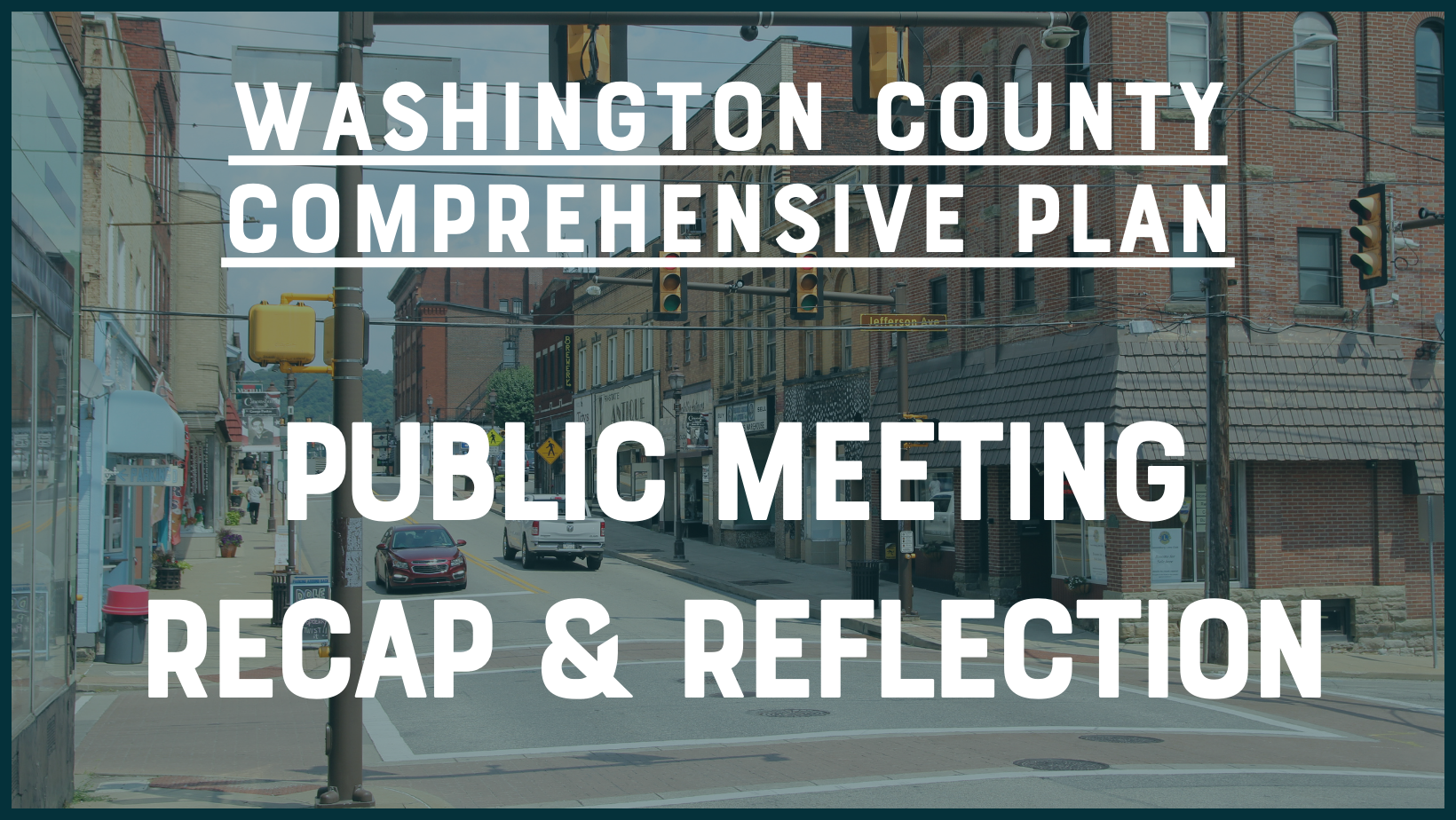Washington County is updating their comprehensive plan, which was last adopted in 2005. The Pennsylvania Municipalities Planning Code (MPC) Act of 1968, P.L. 805, No. 247, defines a County Comprehensive Plan as “a land use and growth management plan prepared by the county planning commission and adopted by the county commissioners which establishes broad goals and criteria for municipalities to use in the preparation of their comprehensive plan and land use regulation.” The comprehensive plan is to be updated every ten years.
The active and ongoing utilization of this plan will establish county-level policies and encourage development that aligns with the smart growth principles and initiatives supported by the Commonwealth. Plan recommendations will remedy deficiencies within the county. The Washington County Comprehensive Plan will better equip county leadership to guide municipal officials as they prepare and update their local comprehensive land use plans and supporting land use ordinances.
The role of the planning commission
Counties are required to prepare a county comprehensive plan and publish advisory guidelines to promote general consistency with the plan. These guidelines are to promote uniformity with respect to local planning and zoning terminology and common types of municipal land use regulations.
Once a county has adopted a comprehensive plan, the MPC requires that municipalities notify the county planning agency regarding any proposed action of the governing body of a municipality, its departments, agencies, and appointed authorities. This shall be submitted to the county planning agency for its recommendations if the proposed action relates to:
- The location, opening, vacation, extension, widening, narrowing or enlargement of any street, public ground, pierhead, or watercourse;
- The location, erection, demolition, removal, or sale of any public structures located within the municipality;
- The adoption, amendment, or repeal of any comprehensive plan, official map, subdivision or land ordinance, zoning ordinance or provisions for planned residential development; or the construction, extension, or abandonment of any water line, sewer line, or sewage treatment facility.
Washington County municipalities are required to submit a finalized copy of their municipal comprehensive plan (including amendments) to the county planning agency within 30 days of adoption. The planning agency then has 45 days to review and make recommendations to that municipality. The municipality must not take action prior to receiving the recommendation, or after 45 days have passed.
School districts must also comply with this. Section 305 of the MPC states that the governing body of a public school district must submit notice of the location, demolition, removal, sale, or lease of any school district structure or land to both municipal and county planning agencies for comment within 45 days prior to the execution of such proposed action.
When it comes to the comprehensive plan, the planning commission is also responsible for identifying target areas of interest in the county that are available for growth and or revitalization, identifying the available uses for each area, and gathering public input. Once the plan is drafted, the commission must hold a public meeting to update the community and collect comments from residents. After the meeting, there is a 45 day comment period for community members to submit their comments to the commission. After that comment period, the plan is set to be finalized by the county.
Reflection
When we attended the Washington County Comprehensive Plan public meeting on June 15th to learn more about it and to see how we can help to get the community more involved in the decision making process, we were pleasantly surprised about how it was set up. We were expecting it to be a long, not very engaging meeting where the planning commission would give a slideshow presentation, give a rundown of how the process works, and then answer questions from residents. We were wrong.
The meeting was set up like an open house with posters on easels containing information from the executive summary of the comprehensive plan. The members of the planning commission were mingling with the attendees, which made the meeting interactive and engaging. This setup gave residents of the community an opportunity to talk one-on-one and voice their concerns and opinions with each member of the planning commission, each of whom specializes in a specific area of the plan. Residents also had the opportunity to leave comments on a note card for the planning commission and steering committee to consider while future decisions are being made.
What we took away from the meeting was a sense that the county’s goals align with some of our organizational goals for the community. However, there are concerns in regard to the education that will be provided about the new resources.
For example, in the Sustainable Places section of the plan, their goal is to “Provide a high quality of life for residents and visitors through the preservation of natural and agricultural resources and of recreation and tourism opportunities.” As you may know, we at CCJ are all about preserving our land and the resources that it provides us. We also encourage and advocate for more recreational opportunities for the residents within the county as well as more tourist attractions to bring in folks from outside our communities. Some ideas we were made aware of at this meeting are promoting river access and making the Washington County Fairgrounds a year-round attraction.
One of the objectives that really stood out is to promote the use of alternative energy sources. While it is not clear what kind of energy sources they plan to bring in and promote, we advocate for those that allow our environment, economy, and residents to thrive and be safe. We left comments that encourage the county to provide educational information and resources about the pros and cons of the alternative energy sources in regard to human and environmental health and wellbeing. We believe that with every new thing they bring into our community related to the extraction industry, there should be information available about how it will affect us and our communities, as well as a plan to keep us all safe in our homes. It is important for this information to be accessible, accurate, and easy to understand.
Another concern that was raised is in regard to housing. While the county is planning to support projects and strategies that promote affordable housing solutions, it is not clear how the information will be provided. They state that the “county should commit resources to ensure education around fair housing rights to the public and to officials.” The county must ensure that those who reside in low income and or low literacy areas are able to access this information so that they can benefit from affordable housing.
The plan is currently in draft form and can be viewed on the county's Comprehensive Plan website. Since the plan has been drafted and the public meeting has been held, the 45-day comment period will end on August 9th. You can direct any comments or questions to the Planning Commission at 724-228-6811 or theakstj@co.washingotn.pa.us. If you would like to submit a comment and need help doing so, please reach out to our Field Program Coordinator Paul at 412-229-7333 or paul@centerforcoalfieldjustice.org.



